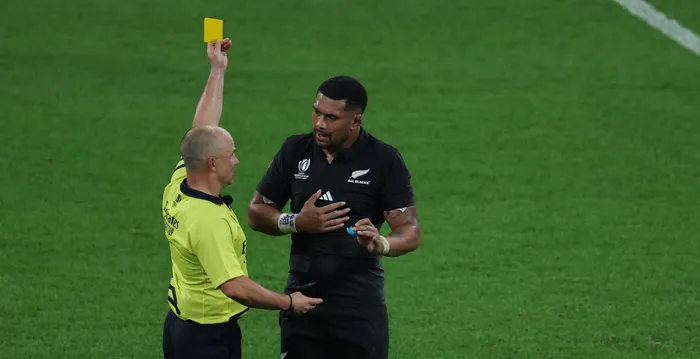Peyper key to Boks adapting to new laws

RETIRED Test referee Jaco Peyper, seen here giving a yellow card to New Zealander Ardie Savea, is busy taking Springbok players through the new rugby laws ahead of Test season. | AFP
BY THIS time next week, World Rugby’s fan-focused laws will be fully in effect, not that it concerns Springbok coach Rassie Erasmus one bit.
The world governing body will implement their new variation on July 1 in an effort to “enhance” the spectacle. The changes include rectifying the “Dupont Law” and introducing free-kick options to the set pieces, especially the reset scrum.
The Boks had an early trial of these laws against Wales this past week in their 41-14 victory at Twickenham, and with the help of former Test referee Jaco Peyper, the coach is confident his team will have an expert understanding of the new rules.
“It is not something big for us,” Erasmus said on Wednesday during a media briefing in Pretoria.
“The scrum, I think there were two free kicks and I think we had one against us. You have to decide if are you going to slow that free kick down; or kick and up-and-under; or, if you are inside your 22, if you are going to kick it out; or, are you going to quick tap, like when you are close to the goal line, are you going to do an old school move?
“The Dupont rule, we have never actually done that were we have advanced. It was France that really did that. That is not a big change.
“The shot clock, at line-outs, that is pushing you, and at scrum time they are making sure you are quicker in there. All of that suits us.
“We still got a lot of scrums (against Wales). We still got a lot of penalties… Overall, we conceded 13 penalties.
The Bok mentor also further expanded on the role of former Test referee Jaco Peyper, who officiated at 67 international matches before retiring due to an Achilles tendon injury.
“Peyper took us through all of the penalties on Wednesday morning,” Erasmus said of the 44-year-old, “and there were definitely seven or eight that were avoidable, that weren’t accidents, that was stupidity from our side.
“He sat one-on-one with the players and with the captain Pieter-Steph du Toit, with Chessie (Cheslin Kolbe), who was vice-captain, and with the wingers on how to talk to the assistant referees, and with the props on how to communicate,” he concluded.
Related Topics: